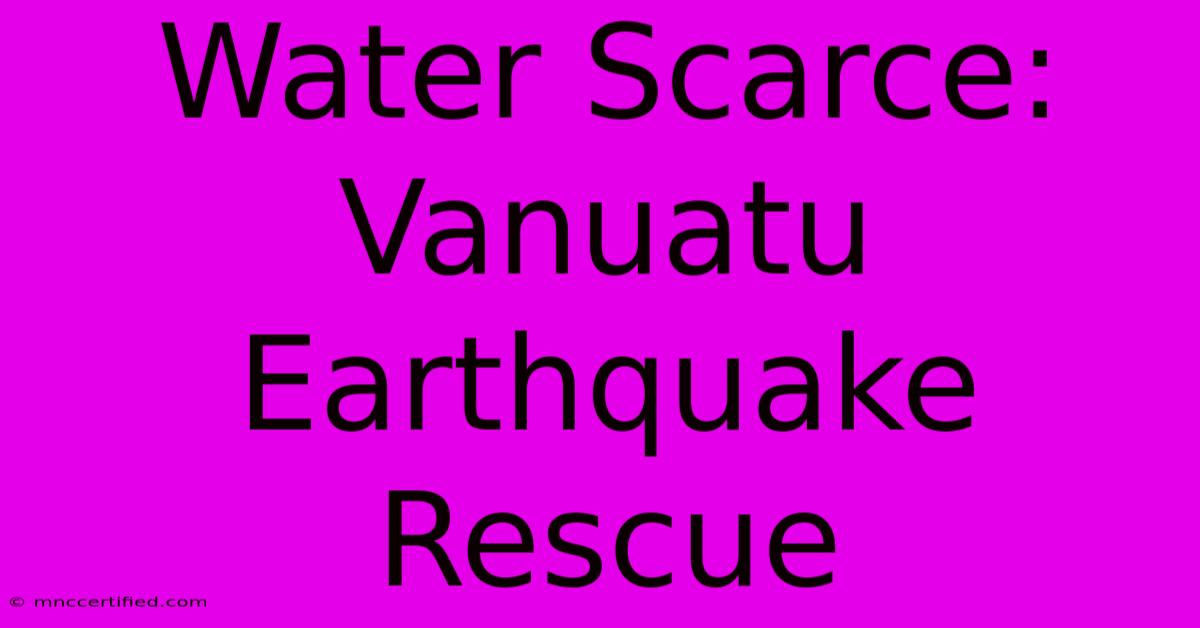Water Scarce: Vanuatu Earthquake Rescue

Table of Contents
Water Scarce: Vanuatu Earthquake Rescue - A Humanitarian Crisis Unfolding
The recent earthquake that struck Vanuatu has left a trail of devastation, but beyond the immediate damage to infrastructure, a silent crisis is unfolding: water scarcity. While international aid organizations are focusing on search and rescue efforts, the long-term implications of limited access to clean water are a major concern, potentially leading to a secondary humanitarian disaster. This article explores the challenges faced by Vanuatu in the aftermath of the earthquake and highlights the urgent need for clean water supplies.
The Earthquake's Impact on Vanuatu's Water Infrastructure
Vanuatu's reliance on fragile water infrastructure has made it extremely vulnerable to the earthquake's impact. Many water sources have been contaminated, rendering them unsafe for drinking. Damaged pipelines and disrupted distribution networks have further exacerbated the problem, leaving communities without access to clean, potable water. This lack of access poses a significant risk of waterborne diseases, such as cholera and typhoid, which could overwhelm already strained medical resources. The situation is particularly dire in remote areas, where access to aid is severely limited.
Challenges in Providing Aid
Getting clean water to those in need is a logistical nightmare. The challenging terrain of Vanuatu, coupled with the earthquake's destruction of roads and bridges, makes transporting water and aid supplies incredibly difficult. Helicopters and boats are being utilized, but these methods are expensive and limited in their capacity. This highlights the urgent need for efficient water purification solutions to be deployed rapidly.
The Urgent Need for Clean Water and Sanitation
The immediate priority is to provide emergency water supplies to affected communities. This involves distributing bottled water, water purification tablets, and setting up temporary water treatment facilities. However, a long-term strategy is crucial, encompassing:
- Repairing damaged water infrastructure: This requires significant funding and expertise, potentially involving international collaboration.
- Improving water storage and distribution systems: This includes building more resilient infrastructure and investing in more efficient distribution networks to ensure future resilience.
- Promoting hygiene and sanitation: Educating communities on hygiene practices to prevent waterborne diseases is essential, alongside providing access to sanitation facilities.
- Investing in sustainable water sources: Exploring alternative and sustainable water sources, such as rainwater harvesting, is crucial for long-term water security in Vanuatu.
The Role of International Aid and Collaboration
The international community has a crucial role to play in addressing the water crisis in Vanuatu. This includes providing financial assistance for water infrastructure repairs, supplying emergency water supplies, and offering technical expertise to improve water management practices. Collaboration between NGOs, government agencies, and international organizations is critical for coordinating effective aid efforts and ensuring that resources are allocated efficiently. Transparency and accountability in aid distribution are crucial to build trust and ensure that the most vulnerable communities receive the support they need.
Long-Term Strategies for Water Security in Vanuatu
The earthquake has highlighted the vulnerability of Vanuatu's water systems and the urgent need for long-term solutions. Investing in resilient infrastructure, promoting sustainable water management practices, and building community capacity are all vital steps towards ensuring water security for the future. This includes:
- Developing early warning systems for natural disasters: These systems can help mitigate the impact of future earthquakes and other natural disasters on water resources.
- Investing in water resource management training: Equipping local communities with the skills and knowledge to manage their water resources sustainably is essential.
- Promoting climate change adaptation strategies: Addressing the impacts of climate change on water resources is critical for long-term water security.
The water scarcity following the Vanuatu earthquake underscores the urgent need for immediate action and long-term planning. International cooperation, coupled with community engagement and sustainable practices, are key to overcoming this challenge and building a more resilient future for Vanuatu. This is not just about providing immediate relief, but about building a foundation for long-term water security in a region highly vulnerable to natural disasters.

Thank you for visiting our website wich cover about Water Scarce: Vanuatu Earthquake Rescue. We hope the information provided has been useful to you. Feel free to contact us if you have any questions or need further assistance. See you next time and dont miss to bookmark.
Featured Posts
-
Conor Mc Gregor Delays Return Confirms Fight
Dec 18, 2024
-
Warren In Bellinger Trade Talks
Dec 18, 2024
-
Dog Saved Host Needs Rescue From Thames
Dec 18, 2024
-
Rnli Crew Jordan Norths Tribute
Dec 18, 2024
-
Keely Hodgkinsons Coaches Painter And Meadows
Dec 18, 2024